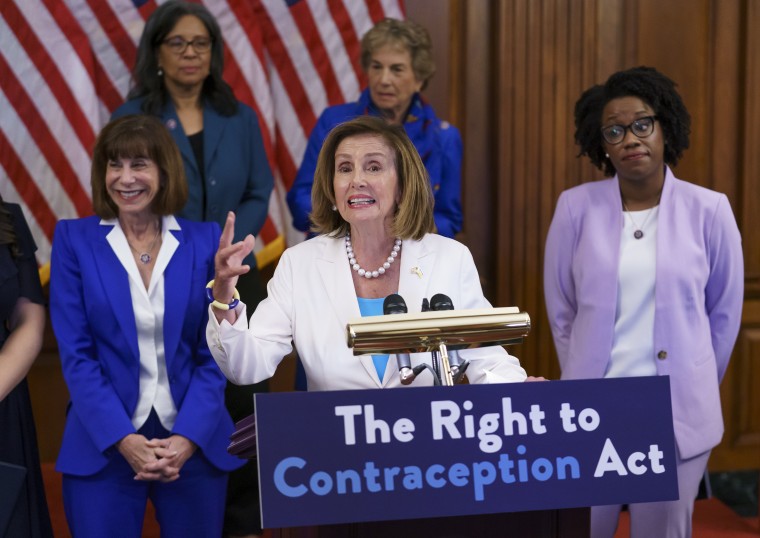By Alam Fram
Associated Press
WASHINGTON — The right to use birth control would be written into law under a measure Democrats are pushing through the House, their latest response of the campaign season to concerns that a conservative Supreme Court that has struck down federal rights to abortion can go further.
The House of Representatives plans to vote on the law this Thursday and send it to the Senate, where its fate is uncertain.
The push exposed Democrats clinging to their own version of culture war battles to appeal to minority, progressive and female voters, portraying the court and Republicans as extremists seeking to strip away rights that have been given for granted for years.
[The House of Representatives approves shielding same-sex marriage against the threat of the Supreme Court. It is expected to be blocked by the Senate]
House Speaker Nancy Pelosi said that now that the "radical, Republican Supreme Court" has overturned the 1973 Roe v. Wade decision, Republican lawmakers want to do more than just ban abortion.
“Those of us who have been in Congress for a long time can say that they have been against contraception, family planning and birth control all along,” said Pelosi, a California Democrat.
“This is your moment.
Clarence Thomas has made it clear.
They have reached the fundamentals of privacy that they want to erase.”
The images of AOC and other congresswomen arrested while protesting in front of the Supreme Court
July 19, 202200:27
In his opinion that annuls the case Roe v.
Wade last month, Judge Clarence Thomas wrote that the court must now review other precedents.
He cited rulings affirming same-sex marriage rights in 2015, intimate same-sex relationships in 2003 and contraceptive use by married couples in 1965.
Thomas did not specify a 1972 decision that legalized contraceptive use by unmarried people as well, but Democrats say they see that as at risk, too.
[Pro-abortion activists believe the US is “turning back time” on reproductive rights]
Thomas and congressional Republicans “are all about one thing, control,” said Rep. Kathy Manning, D-North Carolina, the lead sponsor of the contraception bill, which has about 150 co-sponsors, all Democrats.
“These extremists are working to take away women's rights, to take away our right to decide when to have children, to take away our right to control our own lives and our own bodies.
And we will not let this happen,” she stated.
Sen. John Cornyn, R-Texas, who is close to GOP leaders, said he doubted the legislation could win the Republican support it would need to survive in the Senate.
Democrats have introduced a contraception bill similar to the House version.
"I think it's pure hysteria" on the part of Democrats, Cornyn said of the contraceptive rights bill.
It is “not in danger” of being repealed, she said.
[The Supreme Court restricts the federal government's ability to combat the climate emergency]
House Democrats have begun to force votes on these and other privacy-rights issues, hoping to score long-term victories or at least energize sympathetic voters and donors and force Republicans from competitive districts in tough places.
House Speaker Nancy Pelosi, D-Calif., speaks during an event prior to the vote on the Right to Contraception Act, on Capitol Hill in Washington, Wednesday, July 20, 2022.J.
Scott Applewhite/AP
Last week, the House of Representatives voted to revive abortion rights nationwide, with all Republicans voting against, and voted largely along party lines to ban the persecution of women. women traveling to states where abortion is still legal.
The House of Representatives voted Tuesday to keep same-sex marriage legal, with 47 Republicans joining all Democrats in backing the measure.
Although 157 Republicans voted against it, that result raised expectations that the bill could garner the support of at least 10 Republican senators and garner the 60 votes needed to overcome the Senate's 50-50 vote, sending it to President Joe Biden. for your signiture.
The contraception bill explicitly allows the use of contraceptives and gives the medical community the right to provide them, covering "any device or medication used to prevent pregnancy."
[Supreme Court upholds religious freedom of school coach fired for praying at games]
Examples listed include oral contraceptives, injections, implants such as intrauterine devices, and emergency contraception, which prevent pregnancy several days after unprotected intercourse.
The bill allows federal and state governments, patients, and health care providers to bring civil lawsuits against states or state officials who violate its provisions.
"It's critical that they listen to women."
Maná speaks of the danger of clandestine abortions
July 18, 202202:36
Same-sex marriage may have such wide public acceptance that a growing number of Republicans are willing to vote for it.
But anti-abortion groups oppose the contraception legislation, and it remains to be seen whether a significant number of Republican Party (GOP) lawmakers are willing to make that break.
Susan B. Anthony Pro-Life America said the legislation "seeks to bail out the abortion industry, trample on conscience rights, and demand uninhibited access to dangerous chemical abortion drugs."
The National Right to Life Committee said it "goes far beyond the realm of contraception" and would cover abortion pills like RU486, which supporters said was incorrect.
[The House of Representatives approves raising the minimum age to buy semi-automatic rifles to 21]
Spokespeople for House GOP leaders did not immediately respond to requests for comment on the legislation.
The move drew a mixed reaction from two of the more moderate Republicans in the Senate.
Sen. Susan Collins, R-Maine, said she was "very likely" to support the measure.
Sen. Lisa Murkowski, R-Alaska, was reticent, saying she was working on bipartisan legislation that she said would codify abortion rights and perhaps contraception.
There are few state restrictions on contraceptive use, said Elizabeth Nash, who studies state reproductive health policies for the Guttmacher Institute, a research organization that supports abortion rights.
Nash expressed concern about efforts to curb emergency contraception and intrauterine devices and to help providers and institutions refuse to provide contraceptive services.

